Organ donation: NHS call for discussions with children
Children should be included in conversations about organ donation, the body co-ordinating UK donations says.
Over the past five years 42 children in need of a heart have died waiting for a transplant, NHS Blood and Transplant (NHS BT) said.
Lilly Kendall had heart problems when she was born, forcing her to spend her first three months of life in hospital.
When she was nine, her health deteriorated again, leaving her needing a heart and lung transplant.
Lilly is one example of how young patients wait on average more than two and a half times longer than adults for similar transplants.
NHS BT revealed the statistic as part of of a drive to encourage conversations about organ donation on World Heart Day.
'Living on the edge'
When Lilly, from Llanelli in Carmarthenshire, was 11, she and her family spoke to BBC Wales.
Her mother Catherine, said waiting for the phone call was "like living on the edge".
"As a mum of six, I have to have routine and I have to keep going. When I do have two minutes to myself I do have my downtime," she said.
"And then, most of the time it's spent crying."
At the time, only 16 people were on the double-transplant waiting list and fewer than five of them were children.
As it is such a rare procedure, Catherine prepared for the worst.
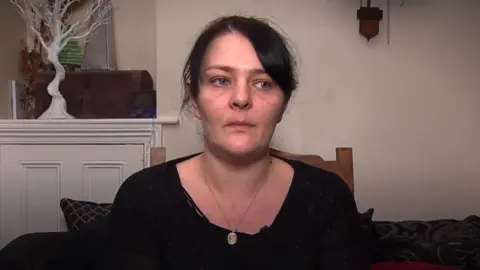
"We've had lots of difficult conversations. Talking about her funerals, what she'd like. And Lilly is quite open with all of this to be honest. Lilly was the one that asked for the conversations to go ahead."
However, a week after the interview, Lilly got the call.
Catherine says she "burst into tears" when she recognised the number on her phone.
Lilly was taken to Great Ormond Street Hospital, and the procedure took more than seven hours to complete.
"I didn't know if she was going to live," Catherine said. "I didn't know what to think."
The operation was successful.
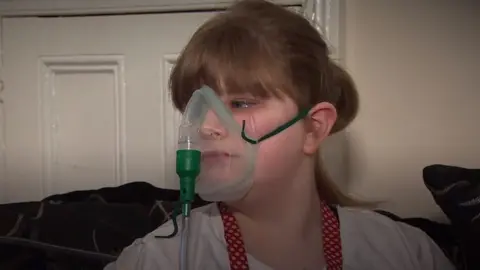
"Her first breaths, that was just amazing. For her to take those first breaths I knew it would be ok from there. She was in intensive care for a while.
"When she woke up she was still quite high on medications, not quite with it, but the first thing she said to me was 'I love you, Mam'."
Lilly, now 12, is continuing to recover and has started going back to school.
"I feel very amazing, very happy," she said.
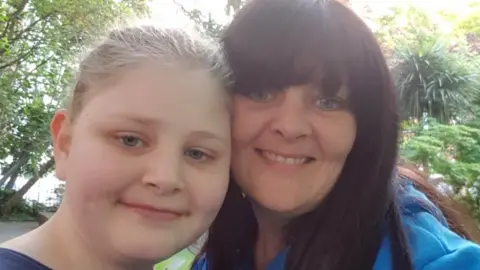 Catherine Kendall
Catherine Kendall"I didn't think I would survive without these new heart and lungs and it's all thanks to the donor it's actually saved me.
"I'm very lucky. For me to get these organs is really special to me and not only to me, to the family as well, because we all thought that I wouldn't live."
The ordeal has highlighted the importance of organ donation for Catherine.
"Without organ donation my daughter wouldn't even be alive today. I'm pretty positive that she didn't have long and without them she wouldn't even be here."
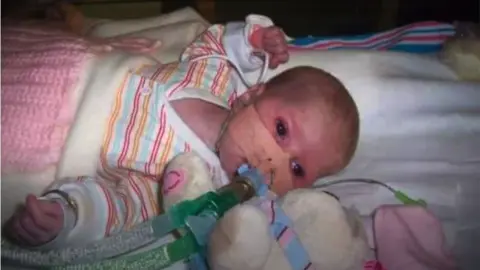 Catherine Kendall
Catherine KendallIn Wales, since December 2015, all those aged over 18 are considered as having agreed to donate their own organs when they die unless they record a decision not to donate.
This will be replicated in England from spring 2020. A similar change will take place in Scotland for people over 16 in autumn 2020.
The current legislation for Northern Ireland is to opt in to organ donation.
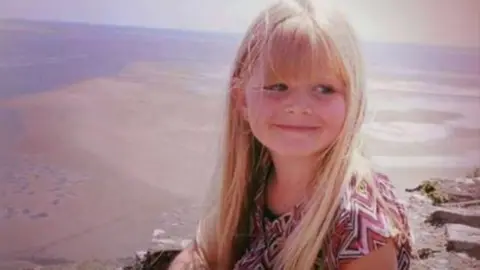 Catherine Kendall
Catherine KendallChildren can join the NHS Organ Donor Register at any age, and in Scotland children can self-authorise from 12 years of age.
However, across the UK, parents must give consent for donation after they die.
Angie Scales, paediatric lead nurse for NHS BT, said children can still sign the register and should be encouraged to do so if it is their wish.
"Children are very open about talking about lots of things, including death, and we as adults often find that more of a challenge than they do," she said.
"So be open and answer the questions that they have, honestly."
The latest figures reveal there were just 56 child donors in the UK in 2018-19.
The year before, there were 57 child donors, and in 2013-14 there were 55.
 Catherine Kendall
Catherine Kendall